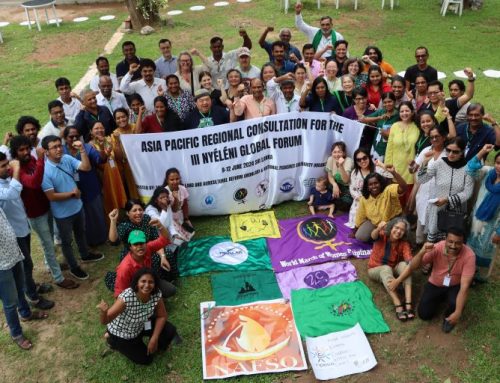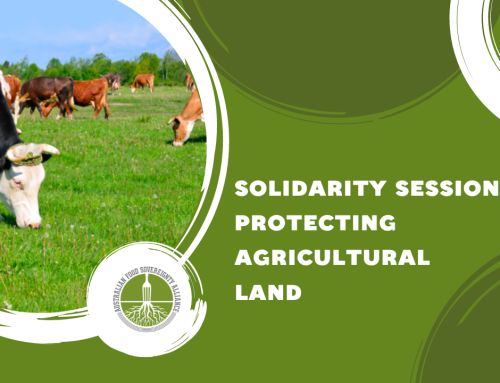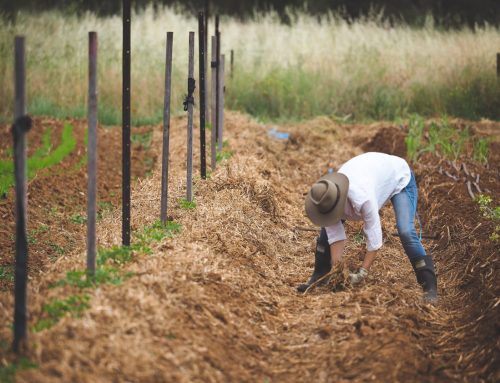Declaration from the 2023 Food Sovereignty Convergence
21-23 October 2023
From 21 to 23 October 2023, small-scale farmers, First Peoples, educators, and allies converged from across Australia to meet on Brinja-Yuin Country, paying our respects to First Peoples in the wake of a disheartening referendum result. We held our annual Food Sovereignty Convergence at SAGE Gardens, Moruya NSW, which sits at the heart of a thriving community that has weathered catastrophic bushfires and flooding in recent years and yet has grown all the more resilient in the face of crises.
This year’s Convergence came just a week after the majority of Australian citizens rejected a First Peoples’ Voice to Parliament, and while Uncle Bunja Smith offered us a beautiful Welcome to Country at the Eating Democracy book launch, many expressed their dismay at the result. However, there was a palpable sense of hope in the room as we gathered together and listened to the inspiring stories of eaters and community members embracing food sovereignty as a politics and an ethics of practice. Hope that grassroots movements can move towards fully recognising First Peoples’ sovereignty, and hope that we can rekindle these conversations through food. We were privileged to have Jordan Nye perform smoking ceremonies to welcome our gathering on Country, as we were smoked in and out of Convergence. We’d like to extend our deepest gratitudes to Uncle Bunja and Jordan for sharing their culture and wisdom with us.
At the Eating Democracy book launch, the irrepressible champion of all things food and community – Costa Georgiadis – led a panel discussion with six of the eleven eaters featured in the book, who talked about their participation in the food system. AFSA President Tammi Jonas spoke to the diversity of stories captured in Eating Democracy, which span different cultures, socio-economic backgrounds, education levels and occupations, yet all share a common thread: a deep, intimate connection to food and the people who grow, prepare and cook food.
We commenced Convergence in usual AFSA style, by democratically determining topics for unconference discussions, which emerged across five key themes: Movement building, agroecology horizontal knowledge sharing, land tenure, land collectives and the intrinsic infrastructure of agroecology. Right to food and First Peoples first were voted as a cross-cutting themes that should make their way into all breakout discussions.
In terms of movement building, discussions consistently highlighted the need for AFSA to strengthen partnerships with ally organisations across civil society, in order to amplify the voices of small-scale producers, First Peoples, fishers, eaters, educators and all those involved in food and agriculture systems. In 2024, AFSA has committed to:
- Create a systems map of agroecological and civil society organisations to find synergies/overlaps to harness diversity and strengthen collectives.
- Establish MOUs with ally organisations and host on the AFSA website.
- Ask ally organisations to co-sign the Peoples’ Food Plan, and help champion specific parts of the Peoples’ Food Plan in government submissions/policy reform.
Also key to this discussion was the need for AFSA to identify (and in some cases help establish) a number of collectives that can be supported by the organisation. From the members and allies in attendance at Convergence, the following collectives were identified for 2024:
- Meat
- Pollinators
- Market gardeners
- Youth
- First Peoples
- Urban farming
- Community infrastructure / food hubs
AFSA already supports existing collectives including the GrAiNZ community, Deep Winter Agrarians, and REKO Dayboro, as well as the nascent Agroecology Action Research Network (AARN). If you are part of a collective you think would benefit from support and connections through AFSA, get in touch via coordinator@afsa.org.au! Stay tuned for more information on how you can get involved in more collectives in the coming months.
Breakout sessions on agroecology horizontal knowledge sharing, making the principles and practice of agroecological farming accessible to all emerged as a key theme that was moulded into solid actions for AFSA and the AARN in 2024, where we have committed to:
- Developing a directory of learning activities on the AFSA website for young people to access
- Establishing a bursary fund for agroecology internships on-farms which prioritises First Peoples, low socio-economic demographics and people with disabilities
As is often the case with land tenure discussions, breakout groups came back to the dilemma of farming on unceded land, and how AFSA can better recognise First Peoples’ sovereignty on Country and moving towards shared access to land and food. AFSA committed to:
- Developing a case study on Ediblescapes to share as a lobbying tool to advocate for access to public land via local council for agroecology/agroforestry; and
- A pay the rent campaign.
The discussions on building better land collectives in Australia centred around a topical and exciting development happening within AFSA: establishing an agrarian trust in Australia. The advisory groups for Farming on Other People’s Land (FOOPL) and the Legal Defence Fund (LDF) have co-formed an Agrarian Trust Working Group with AFSA members to share skills and resources to move this conversation into actions for the year ahead. AFSA also committed to the following actions to build better land collectives:
- Advocate for local governments to set up committees for crown land management;
- Establish a model for succession planning that can be adopted/replicated – advocate for a farming covenant to be included in succession plans;
- Collaborate with Trust for Nature’s program to develop a farming covenant;
- Explore current forms of collective land management in Australia and overseas to determine where the gaps and opportunities are for an agrarian trust or other form of land collective;
- Form alliances with ethical housing providers to help change the housing crisis on co-farming properties.
Finally, breakout discussions on the intrinsic infrastructure of agroecology emphasised that resilient communities need resilient infrastructure, which in addition to funding, relies on shared knowledge and resources that can be adapted and replicated across states and territories. As such, we have committed to:
- Advocating for community infrastructure bodies – existing infrastructure community-owned
- Advocating for funding models for new and existing infrastructure – projects, maintenance costs
- Building on existing resources made available on the AFSA website under the banner ‘Share your blueprint’ (saves everyone reinventing the wheel!)
Considering the right to food and First Peoples first in each of the breakout discussions, AFSA has also committed to championing a Universal Basic Income (UBI) campaign over the course of the next year, which we believe is key to addressing systemic barriers to food sovereignty.
With a strong list of actions under our belt, AFSA concluded the unconference with updates on key activities driving our organisation in 2024. Starting with the updated Peoples’ Food Plan, which encompasses over a decade of policy advocacy to radically transform Australia’s food system. We will continue to drive the Peoples’ Food Plan in the year ahead, positioning it as a living document on the AFSA website that will be updated and adapted in line with changes to government, policy, regulation and legislation. Feeding into the Peoples’ Food Plan is the AFSA Legal Guide, which will also be launched in 2024 thanks to funding from Sustainable Table. The Legal Guide will be a direct extension of the Peoples’ Food Plan, as a living document to help farmers navigate common legal challenges across states and territories, from planning provisions to food safety licences. Finally, we also brought to the fore a critical proposal to help galvanise the food sovereignty movement even further in 2024, through the recruitment of State Liaisons that will see AFSA members lead localised efforts to drive membership and respond to state and territory-based issues. If you’re interested in becoming a State Liaison, email us!
As ground-up collectivising takes shape, we are grateful for growing solidarity with international allies, where AFSA continues to show up and represent its members at global meetings. AFSA participates in meetings as a member of the IPC for Food Sovereignty, which continues to making strides towards embedding smallholders’ rights following the Global Biodiversity Framework at COP 15 in Montreal and upcoming meetings on the 10th Session of the Governing Body on International Treaty on Plant Genetic Resources for Food and Agriculture in Rome this year. In addition, we maintain ongoing relationships with Urgenci: the International Network for CSA, the Civil Society and Indigenous Peoples’ Mechanism (CSIPM), and La Via Campesina, attending its youth, women and regional conferences this year, and sending two committee members to the 8th International Conference in Bogota next month, thanks to LVC for funding all delegates.
We look forward to continuing or commencing to work in solidarity with the many excellent organisations and people acting for food sovereignty in Australia and globally, as well as the many organisations working at the local level.
All this and more we commit to in our struggle for food sovereignty locally and globally. The members once again democratically elected a vibrant National Committee of farmers, food system workers, educators, and academics to lead the important work ahead of us.
After a wildly successful Convergence in Moruya NSW, we conclude this year’s Declaration with an announcement that next year’s event will be held for a second consecutive year on New South Wales’ south coast, this time at Bega! Stay tuned for further information in the coming months.
¡Viva la via campesina! Viva la revolución!






